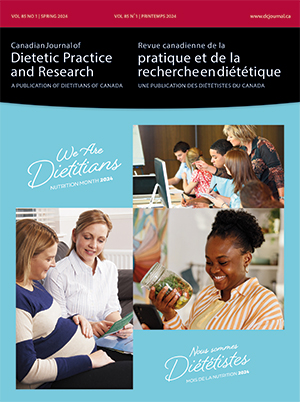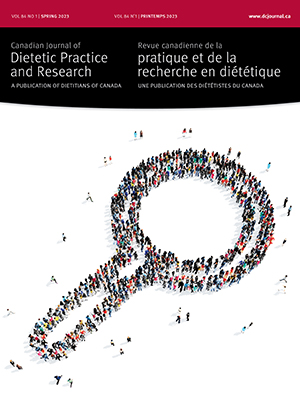Volume 63 • Number 3 • September 2002
Chair’s Message
Review
Little attention has been given to the dietary patterns of new immigrant women in Canada. Research suggests that before migration, many immigrants, especially those from non-Western countries, consume a healthy diet, but this changes on migration. This paper presents information from a recently completed literature review conducted for the Women's Health Council of the Ontario Ministry of Health and Long-Term Care. The paper includes a review of the major determinants of food choice and health promotion strategies appropriate to new immigrant women. Our findings suggest that nutrition intervention for new immigrant women must consider the social context of these women's lives, address cultural, linguistic, economic and informational barriers and consider how these change over time. Recommendations are also made on how to best promote healthy eating in this group.
Report
Canadian dietitians specializing in pediatric practice were surveyed to provide a preliminary profile of the strategies they use to manage overweight youth. The survey was mailed to 298 dietitians belonging to the Dietitians of Canada's (DC) Pediatric Nutrition and Consulting Dietitians’ Networks and to the head dietitians in Canadian pediatric hospitals across the country. It was also posted on the DC website and sent by electronic mail. Of the 164 respondents, 65 reported that they provide an intervention program to overweight youth. Growth charts, ideal body weight, and body mass index were mostly used to assess and monitor overweight. However, about 20% of the respondents did not define overweight in their client population. The majority of the clients were girls aged seven to 18. Most respondents used the healthful lifestyle approach via one-on-one consultation, included parents and collaborated with two or more health professionals for the management of these children. As the discussion on best practices for the prevention and treatment of overweight youth continues, we need further evidence to determine what strategies, if any, support positive outcomes in this group.
Recognition
OPEN ACCESS
The premise of the presentation is a challenge to health care providers to examine the quality of services currently provided in health care facilities across the country. While the Canadian health care system is under scrutiny with numerous reviews and commissions, the underlying question is: are the structural changes making a difference? We need to consider the recommendations in the latest report from the Institute of Medicine, Crossing the Quality Chasm. The report calls for a sweeping redesign and suggests a set of ten new rules to guide patient/clinician relationships. Dietitians must take the lead on implementation of systematic changes, model the way and get involved in the necessary changes. As the report suggests, the gap between where we are and where we need to go in providing quality health care services is not just a crack; it is in fact a chasm.










